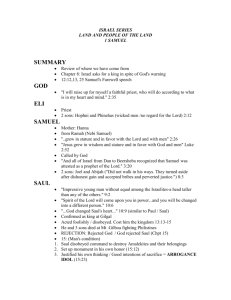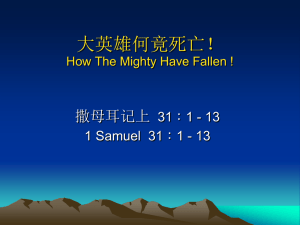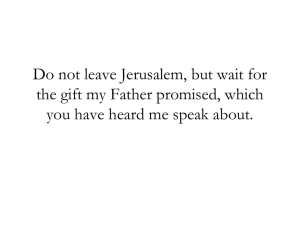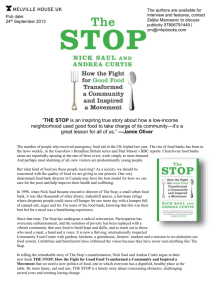The Man who played the fool
advertisement
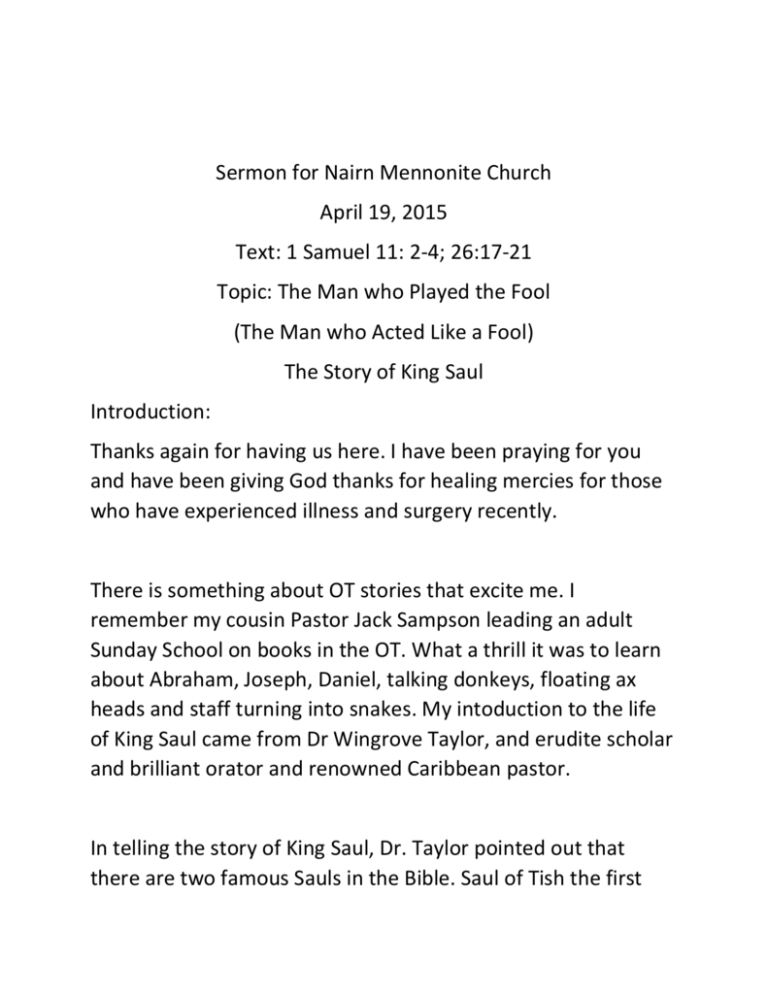
Sermon for Nairn Mennonite Church April 19, 2015 Text: 1 Samuel 11: 2-4; 26:17-21 Topic: The Man who Played the Fool (The Man who Acted Like a Fool) The Story of King Saul Introduction: Thanks again for having us here. I have been praying for you and have been giving God thanks for healing mercies for those who have experienced illness and surgery recently. There is something about OT stories that excite me. I remember my cousin Pastor Jack Sampson leading an adult Sunday School on books in the OT. What a thrill it was to learn about Abraham, Joseph, Daniel, talking donkeys, floating ax heads and staff turning into snakes. My intoduction to the life of King Saul came from Dr Wingrove Taylor, and erudite scholar and brilliant orator and renowned Caribbean pastor. In telling the story of King Saul, Dr. Taylor pointed out that there are two famous Sauls in the Bible. Saul of Tish the first King of Israel and Saul of Tarsus the persecuter of the early church who became Paul, the Apostle to the Gentiles. These two men lived different lives in different timeframes. At the end of life's journey, Saul of Tarsus (Paul) summarized his life with these words: "I have fought a good fight, I have finished the course, I have kept the faith" (2 Tim.4:7). Saul of Kish, on the other hand, summed up his life with these words: " I have played the fool, I have erred exceedingly' (1 Sam 26:21)or as the NIV puts it "I have acted like a fool, I have sinned greatly". Why would King Saul make such a statemnt? To answer that question we have to go through different stages of Saul's life in the Book of 1 Samuel which tells the story of Israel experience with their first appointed king. Let's put this story in its proper historical context by looking at the factors which led to Saul becoming King of Israel in the first place. In 1 Sam 8:1 we learn that although the prophet Samuel had done a very good job as judge, he was getting old and his sons Joel and Abijah had turned away from God making them ineligible to succeed their father. (1 Sam 12:3-5) Besides, it appeared that the children of Israel were tired with their political structure anyway. As a result, the elders of Israel gathered together and came to Samuel at Ramah and said to the prophet: "you are old and your sons do not walk in your ways; now appoint a king to lead us, such as all the other nations have (1 Sam. 8:20) Samuel was upset and felt rejected so he prayed to God but the Lord told him "listen to all that the people are saying to you; it is not you they have rejected as their ruler, it is me. Listen to their request for a king but warn them solemnly and let them know what a king will do. After listening to the Children of Israel, God gave them the king they wanted. In 1 Sam. 9 we learned about the man who was chosen to be king. Saul, the Benjamite, was a 30 year old, impressive young man, without equal among the Israelites - a head taller than any of the others. He was shy, humble and reluctant to accept this position. In fact, when it was time for his inauguation, he was found hiding among the luggage. Saul reigned for 42 years and at the Saul, the king stood before his arch enemy David and confessed "I have played the fool, I have made a huge mistake" How did Saul do that? Saul played the fool with three significant aspects of his life: 1 Saul Played the fool with a Divine Calling Chosen by God to be King of Israel, Saul was put in a position to act on God's behalf. In other words, Saul was supposed to be God's messenger for good. He was to set an example, so that other nations could see what it means to rule a people with justice, caring and godliness. Instead, Saul made some foolish choices that negatively impacted his life and the success of his reign. Saul played the fool with many things that affected his Divine call or his spiritual life. I would like to highlight THREE (a) He usurped Samuel's role as prophet and dabbled into matters that were not his concern. In other word, he mist politics with religion. That is usually called a dictatorship For example, In 1 Sam 13:8-14 there is a story of Jonathan's triumph over the Philistines. The Philistines came back with more men and horses, "like the sands of the seashore" Israel's army was scared and the men began to scatter. Instead of waiting for the Prophet Samuel to come to offer sacrifice which was the prophet's rightful duty, Saul took over and offered the burnt offering. What was the probelm with that? In Deut. 12:514 the children of Israel were advised to be careful not to offer burnt offerings anywhere they pleased but to do so only at a place of God's choosinf. Saul messed up on two fronts - he offered burnt offering in the wrong palce and at the wrong time. Samuel had told him to wait seven days for Samuel to tell him what to do. (b) Saul set up a monument to himself In so doing Saul intended to take honour and praise rightly belong to God. that (c) Saul blamed his people for the bad choices that he made. In 1 Sam. 15:24 Saul says to the prophet I violated the Lord's command and your instructions. I was afraid of the people so I gave into them. 2. Saul played the fool with a Dignified Career or with his professional life. What a career! He was the first appointed King of Israel, he had the second highest honour in the land but the highest civilian position. As the first king, he had the opportunity to frame the role as an expamle for future kings. He had power, privilege, possessions. In warning the Children of Israel about what a King could bring them, Samuel identified 7 levers of a kings power. As King, Saul had (1 Sam. 8:11-18) (a) the power of conscription - can select anyone to his army; join (b) the power of forced cultivation - he could assign people to plow his ground and reap his harvest; (c) the power of ammunition production - he could people make weapons of war and equipment for transportation (d) the power to change peoples occupations - make women perfumers, cooks or bakers; have (e) the power of expropriation - he can seize people's land for his own use; (f) the power of taxation - he could take a 10th of everything his subjects made, grew or own (g) the power of exploitation - he could make slaves of people. May politicans today would give their right arm to have such wide-ranging power. Saul was approved by God, blessed by the prophet, accepted by the people and provided with a wise and trustworthy adviser. In his drunkeness with power, Saul became high on himself; lost his sense of duty to God who had granted him his position as well as his obligation to serve his people who asked for a king in the first place. He disregarded the wise counsel of the prophet Samuel and in the process lost his dignity and lost his job. In Saul's own words, he played the fool with a dignified career. 3. He Played the fool with his Devoted Children - his family life When things go wrong with a person's spiritual and/or professional life, the saying is that "one could always go home" In Saul's case, he could not turn to his family because he played the fool with that relationship as well. The first principle of family life is for the head of the family value, provide and protect your family. Saul messed up his family in a number of ways. Let us look at three; (a) he under-valued the talents of his son Jonathan robbed of him praise that was rightly his. For example,the announcement that "Saul had attacked the Philistine outposts when in fact it was His son Jonathan who did it. Saul almost killed Jonathan by issuing a dumb decree/oath without telling his son about it. Saul decreed that none of his soldiers should eat anything for an entire while they fought the enemy. Jonathan, not being aware of that oath, came upon some honey, was hungry so he dipped his staff into the honey and tasted. Saul condemned his son to die for violating the oath. Jonathan soldiers saved him. (b) he used his daughter Michal's love for David to achieve his personal vendetta against David (1 Sam. 18:17-20). When told that his daughter was in love with David, Saul was pleased and agreed to the marriage. His motive, was that when the Philistine heard that David was Saul's son-in-law, they would go after him and kill him. When that strategy did not work, Saul set out to kill David himself. What father, would set up his daughter's husband in that way? (c) He misused the talents of David his son-in-law and failed to recongize how much respect David had for Saul's position as king. David saw Saul as God's annointed one, a position that deserved the highest respect. Saul was jealous of David's accomplishments in battle and could not stand it when the people shouted that "Saul has slain his thousand but David his tens of thousands. What a family man Saul was! No wonder he had to confess that he played the fool and made a huge mistake. What lessons can the church learn from this story? First of all, we know that according to 2Tim. 3:16-17 that "all scripture is God inspired and is useful for teaching, rebuking, correcting and training in righteousness, so the man of God may be thoroughly equipped for every good work" Stories in the OT can teach us valuable lessons. First, it is important to recognise what is God's divine calling for your life and my life. Each one is called and is equipped for different spiritual service. Young Saul went to look for his father's lost donkeys and returned as King of Israel. David was tending is father sheep, was called into a line-up and was selected to be the second King of Israel. Let us be clear: Who God identifies for service, God also qualifies for that service. Second, God places us in jobs, professions, careers according to our God given talents and abilities. God has place each of you in your current professional position for a purpose. Samuel was a prophet, Saul was a king; each one had a special function to perform for the smooth and just leadership of Israel. There is a growing tendency today to conflate the functions of church and state. We hear politicians pronouncing blessing God bless you and God bless America/Canada, or whatever the nation they represent. Similarly, we see church leaders acting as politicians commenting about how the affairs of state should be conducted claiming that they are doing so in the name of God. God wants us to be passionate about the work God has called us to, but God does not want us to be confused about our function. A song during my elementary school years: The dignity of Labour Let us remember that the dignity of the work we do lies not only in the type of work but in the kind of people called by God to do that work. God, the person who calls us to our various tasks, has the highest standing among employers. Finally, Saul's life story should help us to think/re-think our relationship with our family especially our children/grand children for those who have them. Unlike Saul, we have to value our children, their talents, their perspectives but most of all, their potential. Little did Saul know that the young man who sat at his feet and played the harp to soothe his tormented soul, would one day sit on his throne. Saul saw his children as rivals and bargaining chips, when he should be loving them and providing spiritual and professional modeling for them to follow. How do we see our children and young people? Saul played the fool with his spiritual, professional and family live. In so doing, he lost his position, his possession and his power. How is your spiritual life today? How is professional and family life? Are they where God desires it to be? Let's pray God, we thank you for your timely word, your unfailing love and amazing grace. Show us when we are about to be too high on self or too set in our positions. Help us to learn from the life of King Saul, the consequences of disobedience. Teach us to love like Jonathan, respect you like David and obey you like Samuel. In Jesus name. Amen
